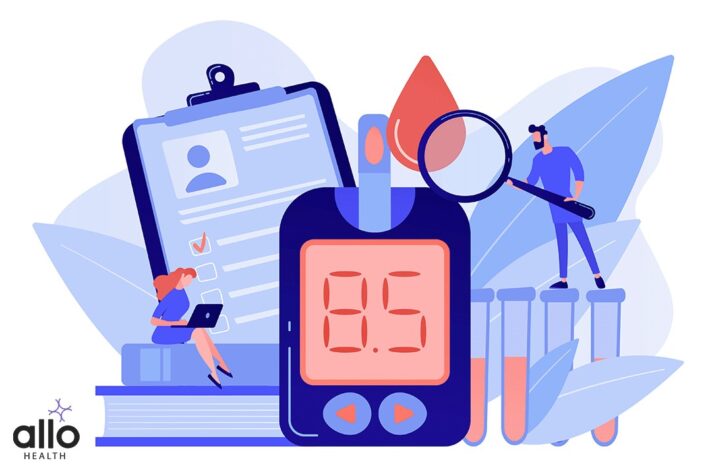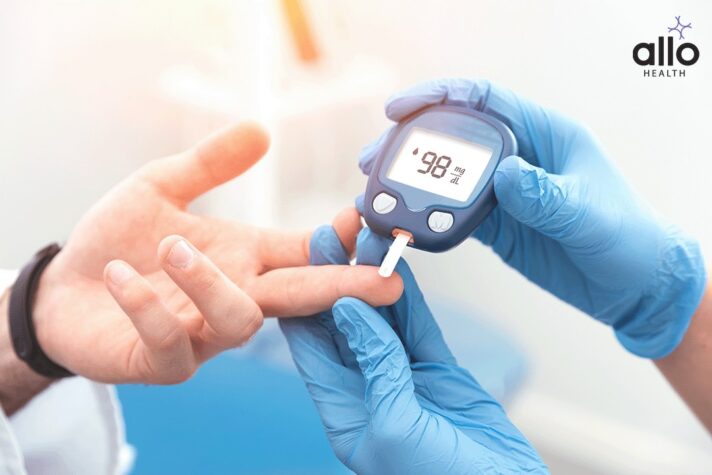Does Diabetes Cause Premature Ejaculation?

Allo Health is dedicated to personalized well-being, offering support and trusted information tailored to individual health goals. The platform emphasizes human-generated content, led by a distinguished medical team of experts, including physicians and sexual health specialists. Their commitment to credibility involves rigorous fact-checking, authoritative research, and continuous updates to ensure accurate, up-to-date information. Allo Health's unique approach goes beyond conventional platforms, providing expert-led insights and a continuous commitment to excellence, with user feedback playing a crucial role in shaping the platform's authoritative voice.

Dr. Aditi completed her undergraduate medical education at AJIMS, Mangalore, after which she worked in multi-speciality hospitals with COVID patients and in the Pain and Palliative medicine department. Driven by her experiences, she developed a keen interest in psychiatry. Dr. Aditi believes that mental health is just as, if not more important, than physical health.
Why This Was Upated?
Our experts continually monitor the health and wellness space, and we update our articles when new information became available.
Updated on 18 June, 2024
- Article was updated as part of our commitment to diversity, equity, and inclusion.

"The following blog article provides general information and insights on various topics. However, it is important to note that the information presented is not intended as professional advice in any specific field or area. The content of this blog is for general educational and informational purposes only.
Book consultation
The content should not be interpreted as endorsement, recommendation, or guarantee of any product, service, or information mentioned. Readers are solely responsible for the decisions and actions they take based on the information provided in this blog. It is essential to exercise individual judgment, critical thinking, and personal responsibility when applying or implementing any information or suggestions discussed in the blog."
Diabetes affects millions of people worldwide and can have a significant impact on various aspects of their health, including sexual function. In diabetic men, premature ejaculation is a common sexual concern that can arise due to several factors related to the condition. In this article, we will explore the link between diabetes and premature ejaculation in men and provide effective management options that can significantly improve their quality of life.
What Is Diabetes?
Diabetes mellitus, commonly known as diabetes, is a chronic medical condition that occurs when the body is unable to properly regulate blood sugar (glucose) levels. Glucose is a vital source of energy for cells, and its levels in the bloodstream are tightly controlled by the hormone insulin. Insulin is produced by the pancreas and helps facilitate the uptake of glucose by cells, particularly in the muscles and liver.
There are several types of diabetes, but the two main ones are:
- Type 1 Diabetes:
- Cause: Type 1 diabetes is an autoimmune disorder where the immune system mistakenly attacks and destroys the insulin-producing beta cells in the pancreas. The exact cause is not fully understood, but both genetic and environmental factors are believed to contribute.
- Onset: Typically diagnosed in children and young adults, hence it was previously referred to as juvenile diabetes.
- Treatment: People with type 1 diabetes require insulin therapy for life. This may involve multiple daily injections or the use of an insulin pump.
- Type 2 Diabetes:
- Cause: Type 2 diabetes develops when the body becomes resistant to the effects of insulin, and the pancreas can’t produce enough insulin to overcome this resistance. Genetic factors, lifestyle choices (such as poor diet and lack of exercise), and obesity are major contributors to type 2 diabetes.
- Onset: It often develops in adulthood, but due to increasing rates of obesity, it is increasingly diagnosed in children and adolescents.
- Treatment: Initially, lifestyle modifications such as diet and exercise are recommended. Medications and insulin may be prescribed if blood sugar levels cannot be adequately controlled through lifestyle changes.
Symptoms of Diabetes: The symptoms of diabetes can vary but may include:
- Frequent urination
- Excessive thirst
- Unexplained weight loss
- Increased hunger
- Fatigue
- Slow healing of wounds
- Blurred vision
Complications of Diabetes: Uncontrolled diabetes can lead to various complications, affecting multiple organ systems. These complications include:
- Cardiovascular diseases
- Kidney damage (diabetic nephropathy)
- Nerve damage (diabetic neuropathy)
- Eye damage (diabetic retinopathy)
- Foot concerns, including infections and amputations
- Skin conditions
- Hearing impairment
Diagnosis and Management: Diabetes is diagnosed through blood tests that measure blood sugar levels. Management involves a combination of lifestyle changes, medications, and insulin therapy. Regular monitoring of blood sugar levels, a balanced diet, regular exercise, and maintaining a healthy weight are crucial components of diabetes management.
It’s important for individuals with diabetes to work closely with healthcare professionals to develop a personalized treatment plan and to actively manage their condition to prevent complications and maintain a good quality of life. Regular check-ups, education about the condition, and support from healthcare providers are essential aspects of diabetes care.

Diabetes Causes
The causes of diabetes are complex and involve a combination of genetic, environmental, and lifestyle factors. The two main types of diabetes, type 1 and type 2, have different underlying causes:
- Type 1 Diabetes Causes:
- Autoimmune Response: Type 1 diabetes is primarily an autoimmune disorder. The immune system mistakenly identifies the insulin-producing beta cells in the pancreas as foreign invaders and attacks and destroys them. This leads to a significant reduction or complete lack of insulin production.
- Genetic Predisposition: There is a strong genetic component to type 1 diabetes. Individuals with a family history of the condition are at a higher risk. However, not everyone with a genetic predisposition develops type 1 diabetes, indicating that environmental factors also play a role.
- Type 2 Diabetes Causes:
- Insulin Resistance: The primary cause of type 2 diabetes is insulin resistance. This occurs when cells in the body, particularly in the muscles, liver, and fat tissues, become less responsive to the effects of insulin. As a result, glucose cannot enter cells efficiently, leading to elevated blood sugar levels.
- Genetic Factors: Type 2 diabetes has a significant genetic component, and individuals with a family history of the condition are at a higher risk. Specific genes may contribute to insulin resistance and the development of diabetes.
- Lifestyle Factors: Unhealthy lifestyle choices, such as a sedentary lifestyle, poor diet, and obesity, contribute to the development of type 2 diabetes. Lack of physical activity and excess body weight, especially abdominal fat, are known risk factors.
- Age and Ethnicity: The risk of type 2 diabetes increases with age. Additionally, certain ethnic groups, including African Americans, Hispanics, Native Americans, and Asian Americans, have a higher predisposition to developing type 2 diabetes.
Other Factors Contributing to Both Types:
- Environmental Triggers: Environmental factors, such as viral infections or exposure to certain toxins, may trigger the onset of type 1 diabetes in individuals with a genetic predisposition.
- Autoimmune Factors in Type 2 Diabetes: While not as pronounced as in type 1 diabetes, some autoimmune factors may contribute to the development of type 2 diabetes. Chronic inflammation and immune system dysfunction may play a role in insulin resistance.
- Gestational Diabetes: Pregnancy-related hormonal changes can lead to gestational diabetes, a temporary form of diabetes. Women who develop gestational diabetes are at an increased risk of developing type 2 diabetes later in life.
It’s important to note that diabetes is a complex condition, and the interplay of genetic and environmental factors can vary among individuals. Prevention and management strategies often involve a combination of lifestyle modifications, medication, and, in the case of type 1 diabetes, insulin therapy. Regular monitoring, early detection, and appropriate medical care are crucial in managing diabetes and preventing complications.
Diabetes Symptoms
Diabetes symptoms can vary depending on the type of diabetes and the stage of the condition. Here are detailed descriptions of symptoms commonly associated with diabetes:
Common Symptoms of Diabetes:
- Frequent Urination (Polyuria):
- Description: Increased production of urine is a common early symptom. The kidneys work to eliminate excess glucose from the blood, leading to increased urine production.
- Cause: Elevated blood sugar levels result in the kidneys pulling in more water to dilute the excess glucose, leading to increased urine output.
- Excessive Thirst (Polydipsia):
- Description: Experiencing intense thirst is often a response to the increased urine output. The body tries to compensate for fluid loss by triggering a sensation of thirst.
- Cause: Dehydration due to frequent urination prompts the feeling of thirst.
- Unexplained Weight Loss:
- Description: Despite increased hunger and food intake, individuals with diabetes may experience unexplained weight loss.
- Cause: In type 1 diabetes, the body’s inability to use glucose for energy due to insulin deficiency can lead to the breakdown of muscle and fat for energy.
- Increased Hunger (Polyphagia):
- Description: People with diabetes often feel excessively hungry, even after eating, due to the body’s inability to use glucose properly.
- Cause: The cells are not receiving enough glucose, leading to a constant feeling of hunger.
- Fatigue:
- Description: Persistent fatigue or weakness is a common symptom of diabetes and can be related to the body’s inability to effectively utilize glucose for energy.
- Cause: Inadequate energy production in cells due to insulin resistance or deficiency.
- Blurred Vision:
- Description: Blurred vision or changes in vision may occur due to fluctuations in blood sugar levels affecting the shape of the eye’s lens.
- Cause: High blood sugar levels can cause temporary changes in the lens, leading to visual disturbances.
- Slow Healing of Wounds:
- Description: Wounds and cuts may take longer to heal in individuals with diabetes.
- Cause: High blood sugar levels can impair the body’s ability to repair and regenerate tissues.
- Frequent Infections:
- Description: Increased susceptibility to infections, especially in the skin, urinary tract, and gums.
- Cause: High blood sugar levels can compromise the immune system, making it less effective in fighting off infections.
- Numbness or Tingling (Peripheral Neuropathy):
- Description: Numbness, tingling, or pain, usually in the hands and feet, can be a sign of nerve damage.
- Cause: Prolonged exposure to high blood sugar levels can damage nerves, leading to neuropathy.
- Itchy Skin:
- Description: Dry and itchy skin can be a symptom of diabetes.
- Cause: Changes in blood circulation and nerve damage can contribute to skin-related concerns.

It’s important to note that the severity and combination of symptoms can vary among individuals, and some people may not experience noticeable symptoms, especially in the early stages of diabetes. If someone is experiencing symptoms suggestive of diabetes, it’s crucial to seek medical attention for proper diagnosis and management. Early detection and intervention can help prevent complications associated with diabetes.
Diabetes Treatment
The treatment of diabetes aims to manage blood sugar levels, prevent complications, and improve the overall quality of life for individuals with the condition. The approach to treatment depends on the type of diabetes, the severity of the condition, and individual factors. Here’s a detailed overview of diabetes treatment:
Type 1 Diabetes Treatment:
- Insulin Therapy:
- Individuals with type 1 diabetes require insulin because their pancreas does not produce insulin. Insulin can be delivered through injections or an insulin pump.
- Multiple daily injections: A combination of rapid-acting and long-acting insulin may be used to mimic the body’s natural insulin production.
- Insulin pump: An insulin pump delivers a continuous supply of insulin, and users can adjust the dosage based on their needs.
- Continuous Glucose Monitoring (CGM):
- CGM devices continuously monitor blood sugar levels throughout the day, providing real-time data to help individuals manage their insulin dosage and make informed decisions about diet and physical activity.
- Carbohydrate Counting:
- People with type 1 diabetes often learn to count carbohydrates to help calculate insulin doses accurately. This method allows for better control of blood sugar levels based on the amount of carbohydrates consumed.
Type 2 Diabetes Treatment:
- Lifestyle Modifications:
- Dietary Changes: Adopting a balanced and healthy diet that focuses on portion control, limiting refined sugars and carbohydrates, and including a variety of nutrient-dense foods.
- Regular Exercise: Engaging in regular physical activity helps improve insulin sensitivity and control blood sugar levels. Aim for at least 150 minutes of moderate-intensity exercise per week.
- Oral Medications:
- Various oral medications are available to lower blood sugar levels. These may include:
- Metformin: Improves insulin sensitivity and reduces glucose production by the liver.
- Sulfonylureas, Meglitinides: Stimulate insulin production.
- DPP-4 Inhibitors, GLP-1 Receptor Agonists: Help regulate blood sugar levels.
- Various oral medications are available to lower blood sugar levels. These may include:
- Injectable Medications: For some individuals with type 2 diabetes, injectable medications such as GLP-1 receptor agonists or insulin may be prescribed to control blood sugar levels.
- Insulin Therapy: In cases where oral medications and injectables are insufficient, insulin therapy may be initiated to better control blood sugar levels.
General Treatment Approaches for Both Types:
- Blood Sugar Monitoring: Regular monitoring of blood sugar levels using a glucometer helps individuals understand how different factors, such as food, exercise, and medication, impact their blood sugar levels.
- Regular Medical Check-ups: Regular visits to healthcare providers are essential for monitoring overall health, adjusting treatment plans, and addressing any emerging concerns or complications.
- Education and Support: Diabetes education programs help individuals bette management. Regular communication with healthcare professionals is crucial for optimizing treatment and preventing complications.
Does Diabetes Cause Premature Ejaculation?
Diabetes can potentially contribute to sexual dysfunction in both men and women, and one of the concerns that may be associated with diabetes is premature ejaculation. Premature ejaculation is a condition where a man ejaculates sooner than he or his partner would like during sexual activity. While diabetes itself may not directly cause premature ejaculation, it can contribute to factors that lead to sexual dysfunction. Here’s how diabetes might be related:
- Neuropathy (Nerve Damage): Diabetes can lead to neuropathy, which is nerve damage that may affect different parts of the body, including the genital area. Nerve damage can interfere with the normal functioning of sensory and motor nerves involved in sexual response. In the context of premature ejaculation, impaired nerve function could potentially contribute to difficulties in controlling ejaculation.
- Blood Vessel Damage: Diabetes is associated with damage to blood vessels (vascular complications). Proper blood flow is crucial for sexual function. Reduced blood flow to the genital area may affect the ability to maintain an erection and control ejaculation.
- Hormonal Changes: Diabetes can lead to hormonal imbalances, such as lower testosterone levels. Testosterone is essential for normal sexual function in men. Changes in hormone levels may influence sexual desire and performance.
- Psychological Factors: Living with a chronic condition like diabetes can have psychological effects, including stress, anxiety, and depression. These psychological factors can contribute to sexual dysfunction, including premature ejaculation.
- Medications: Some medications used in the management of diabetes, such as antidepressants, may have side effects related to sexual function. Antidepressants, for example, are known to sometimes cause sexual side effects, including difficulties with ejaculation.
It’s important to note that not all individuals with diabetes will experience sexual dysfunction, and the severity of the condition can vary widely. Additionally, the relationship between diabetes and sexual dysfunction is complex and may involve a combination of physical and psychological factors.
If someone with diabetes is experiencing sexual dysfunction, including premature ejaculation, it’s crucial to discuss these concerns with a healthcare provider. Open communication allows for a comprehensive evaluation of the individual’s health, consideration of potential contributing factors, and the development of an appropriate treatment plan. Treatment may involve addressing the underlying causes, such as optimizing diabetes management, and may also include psychological or behavioral interventions, medications, or a combination of approaches tailored to the individual’s needs.
Treating Premature Ejaculation Caused By Diabetes
The treatment of premature ejaculation (PE) caused by diabetes involves a comprehensive approach that addresses both the physical and psychological factors contributing to the condition. It’s important to note that managing diabetes itself, optimizing blood sugar control, and addressing potential complications play a crucial role in improving overall health, including sexual function. Here are detailed strategies for treating premature ejaculation associated with diabetes:
Diabetes Management:
- Blood Sugar Control: Strict management of diabetes is essential to prevent or minimize complications, including those affecting sexual function. This involves monitoring blood sugar levels, following a diabetes-friendly diet, taking medications as prescribed, and incorporating regular exercise.
Lifestyle Modifications:
- Healthy Diet: Adopting a balanced and nutritious diet that supports overall health, including cardiovascular health, can positively impact sexual function.
- Regular Exercise: Engaging in regular physical activity helps improve blood circulation, reduce stress, and contribute to overall well-being. Exercise can also have a positive impact on diabetes management.
- Weight Management: Achieving and maintaining a healthy weight is important for both diabetes control and sexual health.
Psychological Interventions:
- Counseling or Therapy: Psychological factors, such as stress, anxiety, and depression, can contribute to premature ejaculation. Counseling or therapy with a qualified mental health professional can help address these concerns.
- Cognitive-Behavioral Therapy (CBT): CBT is a type of psychotherapy that focuses on identifying and modifying negative thought patterns and behaviors. It can be effective in addressing psychological aspects of sexual dysfunction.
Medications:
- Topical Anesthetics: Topical anesthetics, such as lidocaine or prilocaine creams, can be applied to the penis to reduce sensitivity and delay ejaculation. These should be used under the guidance of a healthcare professional.
- Pharmacological Options: Some medications, such as selective serotonin reuptake inhibitors (SSRIs), are commonly prescribed for premature ejaculation. These medications can have an impact on the neurotransmitters involved in ejaculation control. However, their use should be carefully considered, and potential side effects discussed with a healthcare provider.
Sexual Techniques and Behavioral Approaches:
- Behavioral Techniques: Techniques such as the “stop-start” method and the “squeeze” technique involve interrupting sexual activity to delay ejaculation. These techniques may be learned through sex therapy.
- Pelvic Floor Exercises: Pelvic floor exercises, commonly known as Kegel exercises, can help improve sexual function by strengthening the pelvic muscles.
Couple’s Therapy:
- Communication and Intimacy: Including a partner in therapy sessions can help address relationship concerns, improve communication, and enhance overall intimacy.
Medication Review:
- Reviewing Diabetes Medications: If medications used to manage diabetes contribute to sexual dysfunction, healthcare providers may consider adjusting the type or dosage of medications. This should be done under medical supervision.
It’s important for individuals experiencing premature ejaculation related to diabetes to consult with a healthcare professional, preferably a urologist or a sexual health specialist. The healthcare provider can conduct a thorough evaluation, discuss treatment options, and tailor an approach that addresses the specific needs of the individual. Open communication between the individual and their healthcare provider is crucial for successful treatment and improved sexual health.
Most Asked Questions
-
How does diabetes make contributions to erectile disorder?
Diabetes can result in damage to blood vessels and nerves, affecting blood glide and sensation within the genital vicinity. This, in turn, can bring about difficulties accomplishing or preserving an erection. The circumstance's effect on overall cardiovascular health performs a widespread position within the development of erectile dysfunction (ED).
-
Can diabetes-related nerve harm cause erectile disorder?
Yes, diabetes-associated neuropathy, or nerve damage, can make contributions to erectile disorder. Nerves play a essential function within the erectile response by way of transmitting alerts among the mind and the genital region. Damage to these nerves may additionally disrupt this communique, impairing the potential to acquire or preserve an erection.
-
How does blood vessel damage in diabetes affect erectile function?
Diabetes can cause vascular complications, causing damage to blood vessels. Healthy blood go with the flow is vital for erectile characteristic, as an erection requires expanded blood drift to the genital vicinity. Vascular damage can obstruct this system, contributing to concerns in reaching and retaining an erection.
-
Can controlling blood sugar stages help save you or manipulate diabetes-associated erectile disorder?
Yes, preserving most advantageous blood sugar ranges is critical in stopping and dealing with diabetes-associated erectile dysfunction. Consistent high blood sugar ranges contribute to the harm of blood vessels and nerves, exacerbating the chance of ED. Effective diabetes management, together with medicinal drug adherence and life-style adjustments, can definitely impact sexual fitness.
-
What remedy alternatives are available for diabetes-related erectile dysfunction?
Treatment options for diabetes-associated erectile dysfunction encompass medicinal drugs like phosphodiesterase kind 5 (PDE5) inhibitors (e.G., sildenafil, tadalafil), vacuum erection gadgets, penile implants, and way of life adjustments. Seeking recommendation from a healthcare professional is essential to determine the maximum appropriate technique primarily based on individual fitness factors and choices.






































